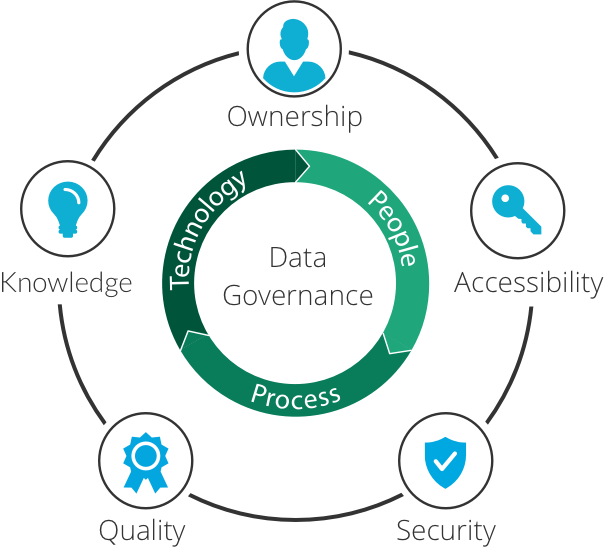
Today, data is more than just a collection of numbers and figures as it’s an invaluable asset that shapes the course of universities. Within higher education, data’s role cannot be understated. I said it previously, but I want to say it again as it is fundamentally important to understand that data is only useful when it is turned into information and that information becomes knowledge, resulting in wisdom (DIKW). From driving student success to shaping strategic planning, the data we generate and consume plays a pivotal role. As the Chief Data Officer of Marshall University, I recognize that understanding and harnessing this data is not just an opportunity or a fad, but a responsibility, thus the critical need for Data Governance.
What is Data Governance?
At its essence, data governance is about ensuring the integrity, security, and quality of an institution’s data. It’s the formal integration of people, processes, and technology to leverage data as an asset.
Why is Data Governance Critical for Higher Education?
- Accountability and Compliance: With increasing pressures related to data privacy and security, universities must ensure they are compliant. Data governance helps in defining and implementing policies aligned with regulations.
- Decision-making: For our institution to make data-informed decisions, we need data that is accurate, consistent, and timely. Governance ensures we have reliable data to drive our strategies.
Starting Data Governance: Our Journey
- Establish a Data Governance Council: We began by assembling a cross-functional team that included representatives from academic affairs, IT, the president’s cabinet, and various data stewards/key stakeholders. This diversity ensured that all voices were heard and that governance policies would be holistic.
- Define a set of guiding principles: Guiding principles serve as a compass, providing clear direction and purpose to help stakeholders understand what matters most, thereby ensuring alignment in thought and action. We have elicited our initial principles to begin addressing where we are today and where we want to be.
- Define our Data Dictionary and Reporting Catalog: One of the first tasks we are working on is to create a common language and gather our existing resources. By defining key terms, metrics, and KPIs, we will eliminate ambiguity and ensure consistency across those accessing and interpreting our data through standardized reports.
- Formalize Data Stewardship: Each functional area designated as a ‘data steward’—an individual responsible for the quality, lifecycle, and policies associated with the data in their area – will become a frontline defender for data quality.
- Embrace Technology: We are currently exploring avenues for tools that will help in data/metadata management, data quality checks, and data lineage. This will ensure that our governance is not just a set of policies but is actively enforced, promoting good data.
- Training and Professional Development: Recognizing that data governance is as much about people as processes, we will include training for the campus community. From understanding data privacy/security to best practices in data ingestion/digestion/regurgitation, we want to empower the campus with knowledge.
- Continuous Review: Data governance is not and will not be a one-time project at Marshall. We are just getting started and have a long way to go, but our council will serve as an iterative committee with reviews to assess the effectiveness of our policies, identify areas of improvement, and ensure that we stay aligned with our goals.
Conclusion
Starting a formal data governance process at Marshall University is not just about compliance or data quality, but it is about laying the foundation for a data-informed/data-driven culture—one where every decision is backed by evidence and every strategy is rooted in analytics and insights. As our university continues this journey, I am elated by the transformative potential of not just data, but of well-governed data to shape the future of our university and beyond.
To governance and beyond, illuminated with data!
Brian M. Morgan
Chief Data Officer, Marshall University